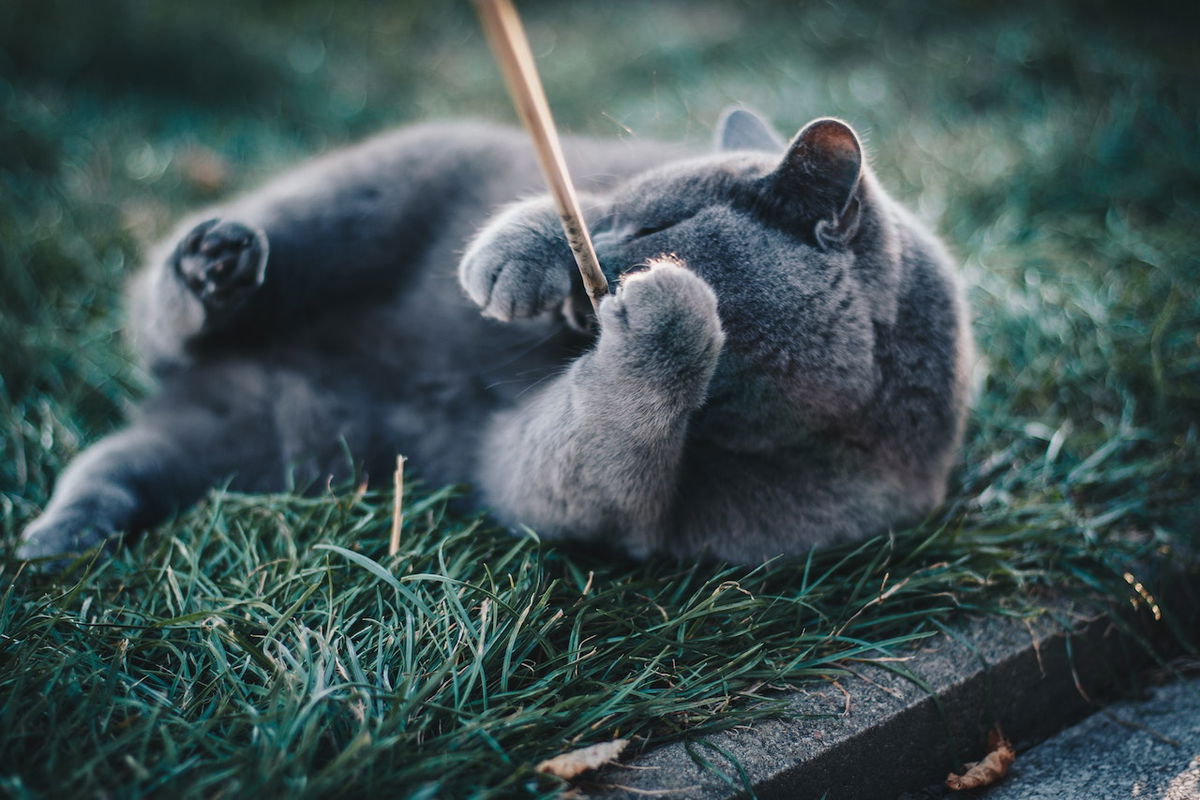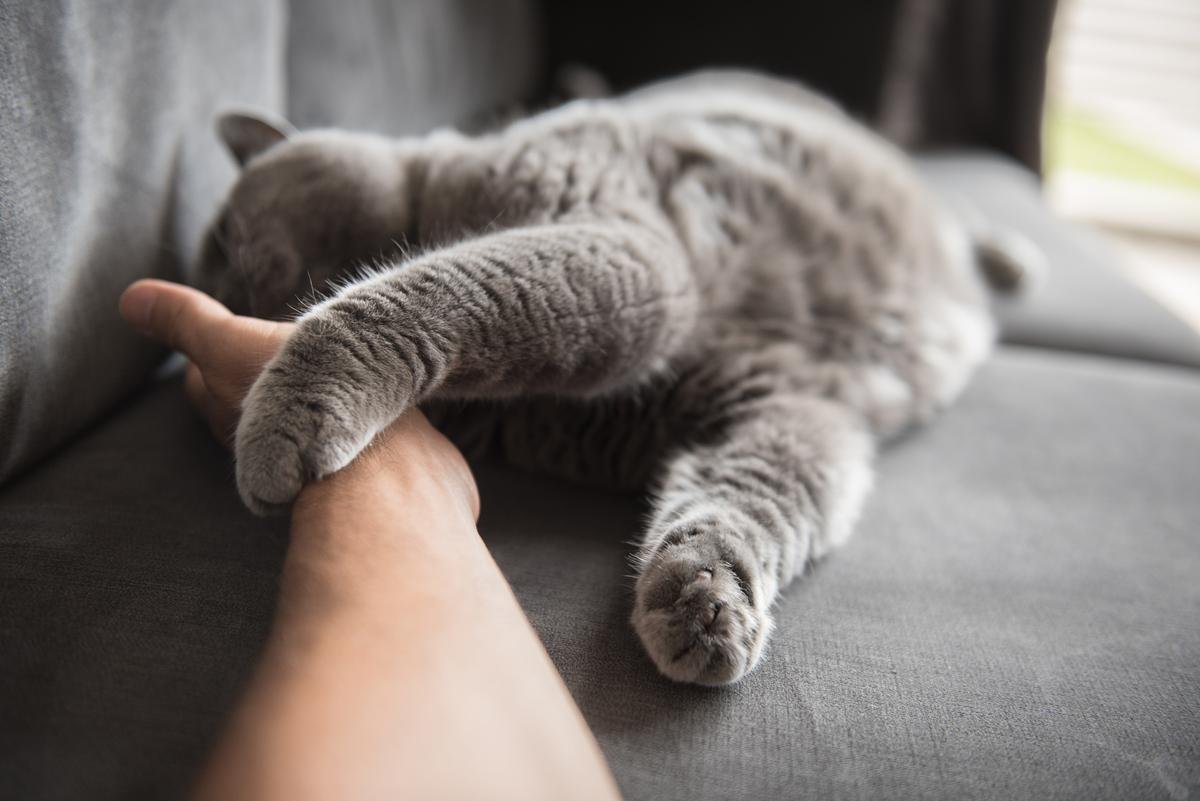We're an affiliate
We hope you love the products we recommend! Just so you know, we may collect a share of sales or other compensation from the links on this page at no additional cost to you. Thank you if you use our links, we really appreciate it!
Every cat owner can relate to that confusing experience where their feline friend may initiate a not-so-friendly attack on their feet.
This should not sound unusual because cats are known for their unpredictability and sometimes quirky behavior.
So, why does your cat attack your feet?
There are various reasons why your feet may get attacked and nibbled by your cat, most of which have nothing to do with real aggression.
Knowing why your feline friend engages in this behavior will help in understanding their behavior helping you in turn to make the right reaction or response.
In this post, we will explain the possible reasons why your cat may pounce on your feet and provide practical solutions to tone down the behavior if it becomes a concern to you.
Attacking or Play Aggression?
Sometimes it can be hard to tell if your feline friend is waging a serious war on your feet or if it’s just another playful gesture.
Cats, especially kittens and adolescents, have lots of energy to expend on various activities.
Playful aggression is when cats engage in mock fights, biting, and clawing in what may appear like full-blown attacks on each other or toward humans.
Your feline friend might see your wiggling toes as an alluring target for a ‘hunt’, making them stalk and pounce on them like prey.

Play-related aggression is common in cats who spend too much time indoors, without the opportunity to engage in physical stimulation with other pets or interactively with toys.
For the most part, predatory aggression in cats should be seen as a friendly gesture and not a sign of hostility.
Play aggression in cats involves a lot of playful bites, soft scratches, ambushes, and thrashing of the tail. Cats will often have dilated pupils with pinned ears when engaging in play aggression.
Real aggression, on the other hand, is characterized by hissing, howling, and intensive scratches that are powerful enough to break into your skin.
If your cat is waging a serious attack, we’d recommend you back off and give them enough room to calm down.
You may have offended your cat or they’re dealing with fear or territorial issues, which makes them go all paws out on you.
Learning how to deal with aggression in cats will increase your chances of solving the problem with love while maintaining a good relationship.
Why Does My Cat Attack My Feet?
1. Play aggression
In many cases, your feline friend may pounce on your feet because of the play-related aggression.
This is a sign that they are looking for a playmate and your feet are a good target to start an interactive mock fight.
Keep in mind that cats are natural hunters, and they can exercise their wild skills by grabbing your ankle and clawing your feet.
They do this by stalking your movement and waging an ‘attack’ on your legs because they resemble moving prey.
Your feet are accessible from the cat’s point of view, and they find it a lot easier to swat around them during playtime to exercise their natural skills.
In most cases, you may have encouraged your cat to continue grabbing your ankles through the rewarding reactions of trying to swing the feet away.
Your cat will take the yells and swift movements as a welcome invitation to continue with the charm offense and work their way to overpower the feet.
2. You’ve not been playing with your cat
Cats who don’t get enough physical stimulation from their human caregivers will find ways of creating their own fun, including preying on their owners’ feet.

Games such as simulated hunts can help cats exercise their natural hunting instincts, and if they don’t get it from you, they will find a way to pounce back.
3. Seeking attention
Decoding your cat’s body language and behavior can be difficult and may be confusing if you react differently.
This is one of those situations where your cat may perform the same act based on two opposite feelings.
Your feline friend may swat at your feet as a way of soliciting your attention, especially if you haven’t played with them for a while.
They may also pounce on you when hungry as a sign of requesting food or water. This is normally accompanied by eye contact and vocalizations such as meowing.
On the flip side, your cat can wage an attack on your feet because you’re offering them too much attention and they desire to be left alone.
This happens when they’re overstimulated when petted in the wrong places, making them vex out their anger through soft aggression and sometimes hugging and biting your arms.
4. Potential medical issues
If your cat suddenly starts attacking your feet out of nowhere and keeps on the behavior for a few more days, then this could be a sign of underlying health problems.
One of the main reasons cats may try to attack is because they may feel threatened when they are in pain. This could also be a warning sign to you not to touch specific places while petting them.
Medical conditions that result in significant hormonal changes may cause your cat to have heightened anxiety and territoriality, which can result in a few bites on your leg.
Hyperthyroidism is one of those conditions that causes affected cats to have increased aggression and restlessness which can result in heightened hunting behavior.
5. It’s a sign of affection
Cats can show affection to their human companions through various ways including biting on their ankles softly and swatting around the feet.
This behavior stems from their instincts where mother cat would always nibble on her kittens when grooming to pass down affection to them.
Your cat’s attacks on your feet could be a sign of expressing their unbounded love and in this case, it’s always accompanied by an increased urge for petting.
Do Cats Grow Out of Attacking Feet?
Most cats should naturally grow out of attacking human feet when they receive enough physical stimulation to ease their need to hunt.
Ankle-grabbing is common among kittens and younger cats who have plenty of energy to explore their environment and exercise their natural drives to pounce on prey.
Their natural desire to attack feet may slow down as they mature due to decreased energy levels and reduced interest in creating mock fights.
However, bush dweller cats may hang onto this behavior for quite a while because they find their confidence in hiding low and pouncing out on targets during playtime.
Your cat may also continue with this behavior into their senior years depending on how you react when they pounce on your ankles.
Encouraging this behavior by moving your feet around and pushing the cat back and forth may instill it in their habits, and they may not grow out of it since it gives them a rewarding experience.
How Do You Stop a Cat from Attacking Your Feet?
Stopping a cat from attacking your feet is actually simple. All you need is to provide your feline friend with an appropriate channel to drive out their energy and exercise their natural hunting instincts.
1. Simulate a hunting experience
The best way to redirect the preying behavior is by playing a fishing pole game to lure your cat into making a chase under corners and up in the air.
Make sure to come up with different creative actions that arouse your cat to continue hunting until they’re exhausted.

You may have to hide the toy under the table and bring it back once again to simulate the natural raw hunting experience for your feline friend.
Do this every day when your cat seems to prepare an attack on your feet to redirect their energy into chasing an interesting toy instead.
2. Ignore the behavior
It may help to ignore your furry friend when they swat on your feet to decrease their interest in preying on you.
Failing to move your feet around will make it an unattractive target for your cat’s attack, and this will help in decreasing the ankle bites.
This could be the perfect time to re-introduce interactive toys or use laser pointers to produce a simulated hunting experience for your feline friend.
Don’t punish your cat for attacking your feet since this may instill fearful behavior and heighten natural aggression.
Punishing your cat will also mean putting an end to your cordial relationship, and it also increases the chances of your cat going all paws out on you.
3. Enrich the environment for your cat
In addition to being proactive during playtime, you need to provide your bush dweller cats with an enriched environment to exercise their chasing and hiding instincts.
Offer them plenty of safe spaces under the table or couch for your cat to hide out and pounce on interactive toys when making a chase.
Don’t forget to provide them with large cat trees to perch and monitor their territory from an elevated point of view to satisfy their predator instincts.
Frequently Asked Questions (FAQs)
1. Why does my cat attack my legs aggressively?
Play aggression could be the reason why your cat seems to start an attack on your legs. Play-related aggression can be mistaken for real aggression, but it is a natural behavior for cats
Your furry friend will do this when trying to look for a playmate or when exercising their hunting skills, and your legs are an attractive target for this.
2. Why does my cat keep trying to bite my feet?
It could be that your feet resemble known prey and your cat is trying to subdue them with a few soft bites and clawing.
Your reaction to this behavior and body language in cats can also tell how they continue interacting with you.
If your cat attacks your feet and you keep wiggling your toes, they will try by all luck to continue with the game to conquer a ‘win’.
3. Why does my cat attack my feet while sleeping?
This could mean that your feline friend is seeking your attention, wants food, or to join you in snuggling under the warm blanket.
For the most part, your cat may grab your ankles in your sleep because they’re trying to communicate their affections and they’re looking forward to nestling in between the feet.
Conclusion – Why Does My Cat Attack My Feet?
Ankle-grabbing habit by cats can be confusing at first, but it probably means they’re looking for a potential playmate or venting out excess energy by hunting.
Kittens and younger cats are more inclined to show this behavior since they have loads of energy that can be channeled into chasing down an attractive target.
Cat owners need to learn the difference between play aggression and actual aggression to make positive engagements with their felines.
The best way to redirect your cat from foot attacks is by providing plenty of interactive cat toys that can simulate a natural hunting experience.
Ignoring your cat during ankle bites can help ease down their urge to prolong the attack. You can do this by simply walking away into a different room.
We recommend that you engage with your feline friend as much as possible to understand their body language and communication style to make your reaction positive.
Laura is the founder of Furs'n'Paws. She is a also a pet writer and expert with more than 20 years of experience of working with dogs and cats. She developed a very strong love for animals at a young age. Her passion led her to establish a thriving pet sitting and dog walking business in Dubai. As an expert in pet training, behavior, and nutrition, Laura is committed to helping pet owners and pet lovers by offering high-quality information on a wide range of topics.



No responses yet